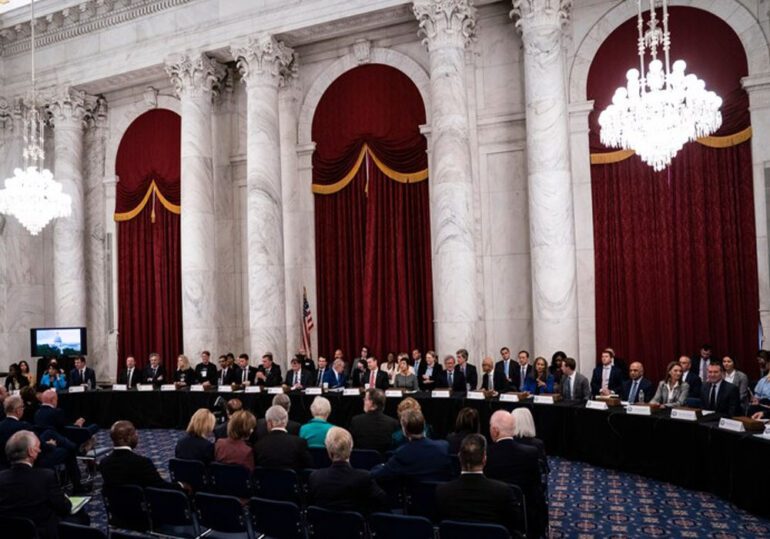TL;DR:
- Elon Musk, Mark Zuckerberg, and Sundar Pichai gather with tech leaders to discuss AI policy at the US Capitol.
- Musk emphasizes the need for an AI regulator to ensure safe AI development and usage.
- Zuckerberg highlights Congress’s role in supporting AI innovation and establishing safeguards.
- Over 60 senators participated, agreeing on the necessity of government AI regulation.
- The forum initiates bipartisan efforts to shape AI policy for Congress.
- Industry giants like Microsoft, IBM, and Nvidia are actively engaged in AI governance.
- Concerns raised by Senator Josh Hawley regarding tech monopolies’ influence.
- Adobe, IBM, Nvidia, and others commit to AI standards endorsed by President Biden.
- The White House is crafting an AI executive order.
Main AI News:
In a pivotal gathering of tech titans at the hallowed halls of the US Capitol, Elon Musk, the visionary CEO of Tesla, has fervently championed the call for an AI “referee” to oversee the burgeoning artificial intelligence landscape. This high-stakes rendezvous brought together luminaries from industry juggernauts such as X, Meta, Microsoft, Alphabet, and OpenAI to engage in a closed-door forum delving into the labyrinthine realms of AI policy in the nation’s capital.
The symposium, featuring the likes of Meta Platforms’ CEO Mark Zuckerberg and Alphabet’s CEO Sundar Pichai, unfolded behind a veil of secrecy, focusing on the urgent need to regulate the transformative power of AI. The quest for effective governance in this digital frontier has gained immense traction, spurred on by the meteoric rise of OpenAI’s ChatGPT chatbot, which has captured both investor fervor and public imagination.
Elon Musk, ever the harbinger of technological advancements, articulated the imperative for a regulator to safeguard the judicious use of AI. In his words, “It’s important for us to have a referee,” likening it to the structured governance of sports. The billionaire entrepreneur, who also presides over the social media behemoth X, emphasized that a regulator would act as a sentinel, ensuring that companies take actions that prioritize safety and the welfare of the general public.
Musk underscored the significance of the moment, characterizing the gathering as a “service to humanity” and speculating that it “may go down in history as very important to the future of civilization.” During the forum, he did not shy away from labeling AI as a “double-edged sword,” acknowledging its potential for both promise and peril.
Mark Zuckerberg, the luminary behind Meta Platforms, articulated the perspective that Congress should proactively engage with AI to foster innovation while establishing safeguards. In his view, this emerging technology necessitates a delicate equilibrium, and the onus of defining the standards falls upon the government, which bears ultimate responsibility in this endeavor. Zuckerberg emphasized the advantage of American companies collaborating with the government to shape the contours of AI governance on critical issues.
Over 60 senators actively participated in the proceedings, underscoring the unanimous consensus regarding the imperative need for government regulation in the realm of AI. Nevertheless, the timeline and specifics of such regulation remained elusive, with some lawmakers acknowledging the complexities inherent in crafting legislation.
Senators Mike Rounds and Cory Booker, representing different perspectives, concurred that government intervention is necessary to guard against potential threats posed by AI, including deepfakes, election interference, and critical infrastructure attacks. The challenge, however, lies in translating this consensus into effective safeguards.
This seminal gathering marked the inception of a monumental bipartisan initiative aimed at laying the foundation for AI policy that can garner the support of Congress. Senate Majority Leader Chuck Schumer, a staunch Democrat, highlighted the pivotal role of Congress in maximizing the benefits of AI while mitigating its inherent risks. The discussions revolved around why Congress must take action, the key questions to pose, and strategies to forge a consensus for safe innovation.
Among the distinguished attendees were luminaries like Jensen Huang, CEO of Nvidia, Satya Nadella, CEO of Microsoft, Arvind Krishna, CEO of IBM, and the iconic Bill Gates, former CEO of Microsoft. Liz Shuler, President of the AFL-CIO labor federation, also graced the forum with her presence.
The discourse underscored the urgency of AI governance, echoing Elon Musk’s call for a cautious approach. In March, Musk, along with a consortium of AI experts and industry leaders, advocated for a six-month moratorium on the development of AI systems surpassing OpenAI’s GPT-4, citing potential societal risks.
This week, the corridors of Congress are abuzz with discussions surrounding AI, with three separate hearings dedicated to this transformative technology. Microsoft’s President, Brad Smith, underscored the need for Congress to mandate safety mechanisms for AI governing critical infrastructure.
However, amid this chorus of voices advocating for regulation, Republican Senator Josh Hawley questioned the closed-door session, expressing skepticism about Congress’s track record in enacting meaningful tech legislation. He raised concerns about the wisdom of soliciting advice from tech giants who arguably hold monopolistic sway.
Across the globe, regulators grapple with the complex task of framing rules to govern generative AI, which has the power to create text and images with near-indistinguishable artificial origins. Recent commitments by Adobe, IBM, Nvidia, and others, endorsing President Joe Biden’s voluntary AI standards aim to ensure that AI’s formidable capabilities are harnessed responsibly. These commitments, announced in July, have garnered support from tech luminaries like Google, OpenAI, and Microsoft.
In tandem with these efforts, the White House is actively crafting an AI executive order, signaling a concerted effort to navigate the intricate terrain of artificial intelligence governance. As the world teeters on the precipice of a transformative technological era, the call for an AI “referee” resonates as a clarion call to usher in an era of responsible AI innovation.
Conclusion:
The high-profile gathering of tech leaders and their unanimous call for AI regulation signals a pivotal moment in the AI market. As discussions around responsible AI governance intensify, businesses in the AI sector must anticipate increased scrutiny and potential regulatory changes. Collaborations between industry giants and governments may shape the future landscape of AI, emphasizing the importance of responsible and ethical AI development.

